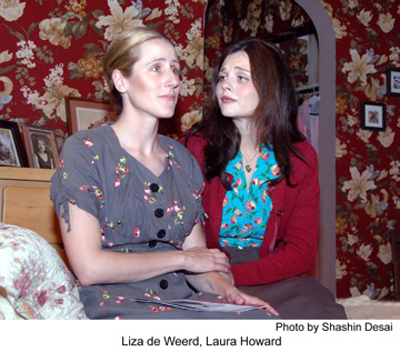By Cynthia Citron

LONG BEACH, California –Is it too soon to pan a play about the Holocaust?
Sadly, 65 years after the stories from the death camps shocked and horrified the world, the shock and horror revealed in Barbara Lebow’s 1989 play A Shayna Maidel” (Yiddish for “a pretty girl”) seems somewhat manipulative.
The play is about a family from Poland, split by circumstance, in which the father and younger daughter fled to America while the mother stayed behind with the “big sister” who was ill with scarlet fever. Reunited as adults, after the war, the sisters are strangers to each other. Raizel, now Rose, is a self-confident American woman, while Lusia is still a ragtag, haunted victim.
Liza de Weerd gives Lusia a luminous dignity, especially in the scenes where she remembers her husband Duvid (a vigorous Charles Pasternak), her girlhood friend Hanna (Erin Anne Williams), and her beloved Mama (Julia Silverman). Laura Howard, in contrast, plays Rose as pathologically perky, chirping her way through the role almost to the point of inappropriateness. It may have been meant to cheer up her tormented sister, but it was, in fact, terminally annoying.
As the girls’ Old World father, Mordechai Weiss, Larry Eisenberg is the pitch-perfect example of that stubborn, opinionated, overly proud breed. The sort of man who wouldn’t accept a loan that he wasn’t sure he could pay back, even if it meant leaving his wife and daughter in Poland to perish. (Of course, he didn’t know at the time that he was leaving his wife to perish and his older daughter to barely survive the camps, and he is condemned to live with that unspoken guilt for the rest of his life.)
Of the many tear-jerking moments, however, there is one terribly authentic scene in which Mordechai stoically reads aloud his list of erstwhile relatives and Lusia responds with a cold, deadly numbness, revealing what had happened to each of them. THAT scene left me with chills.
Barbara Lebow has written other plays and has received a Guggenheim Fellowship and an Award in the Arts from the Governor of Georgia, among other awards. She is obviously a gifted playwright and is adept at writing moving dialogue. The problem is, there is just too much of it. At two and a half hours A Shayna Maidel is way too long and needs extensive cutting (and a little lightening up). And, ironically, while you are meant to feel sympathy for Lusia and her friend Hanna, they remain somewhat inaccessible, since playwright Lebow leaves to your imagination what happened to them in the camps, how they survived, and how they became the women that they are. In fact, once your imagination has done its worst, Lusia’s prevailing optimism and her certitude that her husband has survived becomes almost inexplicable.
And, as always in plays with a Jewish theme, the question of when to translate the Yiddish phrases and when to leave them for the audience to grasp at their gist is always present. Too much translation makes the play seem like a visit to Berlitz; too little makes the audience feel like outsiders. A Shayna Maidel straddles this question and sometimes misses the mark.
The play is directed by Shashin Desai, founding artistic director and producer of the International City Theatre of Long Beach. The set design, vintage 1946, is by Stephen Gifford, the light and sound by Chris Kittrell, and costumes by Kim DeShazo.
A Shayna Maidel will continue at the International City Theatre, Long Beach Performing Arts Center, 300 East Ocean Blvd. in Long Beach Thursdays through Saturdays at 8 p.m. and Sundays at 2 through July 3rd. Call (562) 436-4610 for tickets.
*
Citron is Los Angeles bureau chief for San Diego Jewish World
